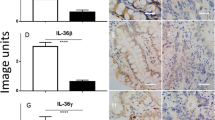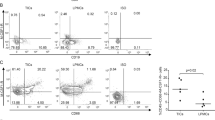Abstract
Colorectal cancer (CRC) is still a big killer nowadays, but the precise underlying mechanism remains to be explored. It is believed that imbalance of host immunity in the local microenvironment plays a critical role in the tumorigenesis of CRC. IL-34 is inversely correlated with overall survival in CRC patients, perhaps via regulating terminal differentiation of a subset of macrophages (M2). It is believed that the recruitment/differentiation of M2 macrophages within the cancer simply represents an increase in number, but the function of these M2 macrophages may be compromised. IL-36s (IL-36α, β and γ) are constitutively expressed in non-cancer colon tissue, but colonic IL-36α, IL-36β and IL-36γ are substantially reduced in the CRC tissues (~ 80%). IL-36α is an independent factor affecting the survival of CRC patients. The level of IL-36α and/or IL-36γ in CRC tissue could potentially be used as biomarkers for predicting the prognosis of CRC at both the later or early stages of CRC. IL-38 is also an anti-inflammatory cytokine. Colonic IL-38 is ~ 95% lower in CRC compared to non-CRC colonic tissue, consistent with the positive correlation between differentiation of CRC, and colonic tumour expression of IL-38. IL-38 is a reliable/sensitive biomarker for distinguishing between CRC and non-cancer colonic tissue. There is a positive correlation between colonic IL-38 in CRC and prognosis and/or overall survival, particularly in advanced CRC, supporting IL-38 probably being a reliable and consistent independent factor in predicting the prognosis of CRC. The findings above may be useful in exploring therapeutic targeting for precision medicine.
Similar content being viewed by others
Data availability
Not applicable.
References
Baghdadi M, Wada H, Nakanishi S, Abe H, Han N, Putra WE et al (2016) Chemotherapy-induced IL34 enhances immunosuppression by tumor-associated macrophages and mediates survival of chemoresistant lung cancer cells. Cancer Res 76:6030–6042
Barros MH, Hauck F, Dreyer JH, Kempkes B, Niedobitek G (2013) Macrophage polarisation: an immunohistochemical approach for identifying M1 and M2 macrophages. PLoS One 8:e80908
Boulakirba S, Pfeifer A, Mhaidly R, Obba S, Goulard M, Schmitt T et al (2018) IL-34 and CSF-1 display an equivalent macrophage differentiation ability but a different polarization potential. Sci Rep 8:256
Boutet MA, Bart G, Penhoat M, Amiaud J, Brulin B, Charrier C et al (2016) Distinct expression of interleukin (IL)-36alpha, beta and gamma, their antagonist IL-36Ra and IL-38 in psoriasis, rheumatoid arthritis and Crohn's disease. Clin Exp Immunol 184:159–173
Cali B, Molon B, Viola A (2017) Tuning cancer fate: the unremitting role of host immunity. Open Biol 7
Catalan-Dibene J, McIntyre LL, Zlotnik A (2018) Interleukin 30 to Interleukin 40. J Interf Cytokine Res 38:423–439
Chen F, Qu M, Zhang F, Tan Z, Xia Q, Hambly BD et al (2020a) IL-36 s in the colorectal cancer: is interleukin 36 good or bad for the development of colorectal cancer? BMC Cancer 20:92
Chen F, Zhang F, Tan Z, Hambly BD, Bao S, Tao K (2020b) Interleukin-38 in colorectal cancer: a potential role in precision medicine. Cancer Immunol Immunother 69:69–79
De Robertis M, Poeta ML, Signori E, Fazio VM (2018) Current understanding and clinical utility of miRNAs regulation of colon cancer stem cells. Semin Cancer Biol
Dinarello C, Arend W, Sims J, Smith D, Blumberg H, O'Neill L et al (2010) IL-1 family nomenclature. Nat Immunol 11:973
Ding L, Wang X, Hong X, Lu L, Liu D (2018) IL-36 cytokines in autoimmunity and inflammatory disease. Oncotarget 9:2895–2901
Elinav E, Nowarski R, Thaiss CA, Hu B, Jin C, Flavell RA (2013) Inflammation-induced cancer: crosstalk between tumours, immune cells and microorganisms. Nat Rev Cancer 13:759–771
Fonseca-Camarillo G, Furuzawa-Carballeda J, Iturriaga-Goyon E, Yamamoto-Furusho JK (2018) Differential expression of IL-36 family members and IL-38 by immune and nonimmune cells in patients with active inflammatory bowel disease. Biomed Res Int 2018:5140691
Fuchs CS, Giovannucci EL, Colditz GA, Hunter DJ, Speizer FE, Willett WC (1994) A prospective study of family history and the risk of colorectal cancer. N Engl J Med 331:1669–1674
Furue K, Yamamura K, Tsuji G, Mitoma C, Uchi H, Nakahara T et al (2018) Highlighting interleukin-36 signalling in plaque psoriasis and pustular psoriasis. Acta Derm Venereol 98:5–13
Ghidini M, Petrelli F, Tomasello G (2018) Right versus left colon cancer: resectable and metastatic disease. Curr Treat Options in Oncol 19:31
Grivennikov SI (2013) Inflammation and colorectal cancer: colitis-associated neoplasia. Semin Immunopathol 35:229–244
Kasi PM, Shahjehan F, Cochuyt JJ, Li Z, Colibaseanu DT, Merchea A (2019) Rising proportion of young individuals with rectal and colon cancer. Clin Colorectal Cancer 18:e87–e95
Kobayashi T, Baghdadi M, Han N, Murata T, Hama N, Otsuka R et al (2019) Prognostic value of IL-34 in colorectal cancer patients. Immunol Med 42:169–175
Laoui D, Movahedi K, Van Overmeire E, Van den Bossche J, Schouppe E, Mommer C et al (2011) Tumor-associated macrophages in breast cancer: distinct subsets, distinct functions. Int J Dev Biol 55:861–867
Lea D, Haland S, Hagland HR, Soreide K (2014) Accuracy of TNM staging in colorectal cancer: a review of current culprits, the modern role of morphology and stepping-stones for improvements in the molecular era. Scand J Gastroenterol 49:1153–1163
Ley K (2017) M1 means kill; M2 means heal. J Immunol 199:2191–2193
Lin JH, Giovannucci E (2010) Sex hormones and colorectal cancer: what have we learned so far? J Natl Cancer Inst 102:1746–1747
Mager LF, Wasmer MH, Rau TT, Krebs P (2016) Cytokine-induced modulation of colorectal cancer. Front Oncol 6:96
Marsland BJ, Trompette A, Gollwitzer ES (2015) The gut-lung axis in respiratory disease. Ann Am Thorac Soc 12(Suppl 2):S150–S156
McEntee CP, Finlay CM, Lavelle EC (2019) Divergent roles for the IL-1 family in gastrointestinal homeostasis and inflammation. Front Immunol 10:1266
Nishida A, Hidaka K, Kanda T, Imaeda H, Shioya M, Inatomi O et al (2016) Increased expression of interleukin-36, a member of the interleukin-1 cytokine family, in inflammatory bowel disease. Inflamm Bowel Dis 22:303–314
Pan QZ, Pan K, Zhao JJ, Chen JG, Li JJ, Lv L et al (2013) Decreased expression of interleukin-36alpha correlates with poor prognosis in hepatocellular carcinoma. Cancer Immunol Immunother 62:1675–1685
Platell CF, Semmens JB (2004) Review of survival curves for colorectal cancer. Dis Colon Rectum 47:2070–2075
Ponz de Leon M, Percesepe A (2000) Pathogenesis of colorectal cancer. Dig Liver Dis 32:807–821
Ponz de Leon M, Benatti P, Borghi F, Pedroni M, Scarselli A, Di Gregorio C et al (2004) Aetiology of colorectal cancer and relevance of monogenic inheritance. Gut 53:115–122
Rogers AC, Winter DC, Heeney A, Gibbons D, Lugli A, Puppa G et al (2016) Systematic review and meta-analysis of the impact of tumour budding in colorectal cancer. Br J Cancer 115:831–840
Russell SE, Horan RM, Stefanska AM, Carey A, Leon G, Aguilera M et al (2016) IL-36alpha expression is elevated in ulcerative colitis and promotes colonic inflammation. Mucosal Immunol 9:1193–1204
Schon MP (2019) Adaptive and innate immunity in psoriasis and other inflammatory disorders. Front Immunol 10:1764
Seidel JA, Otsuka A, Kabashima K (2018) Anti-PD-1 and Anti-CTLA-4 therapies in cancer: mechanisms of action, efficacy, and limitations. Front Oncol 8:86
Siegel R, Desantis C, Jemal A (2014) Colorectal cancer statistics, 2014. CA Cancer J Clin 64:104–117
Sobin LH, Gospodarowicz MK, Wittekind C, International Union against Cancer (2010) TNM classification of malignant tumours. Wiley-Blackwell, Chichester
Solahaye-Kahnamouii S, Farhadi F, Rahkare-Farshi M, Pakdel F, Kashefimehr A, Pouralibaba F et al (2014) The effect of interleukin 36 gene therapy in the regression of tumor. Iran J Cancer Prev 7:197–203
Takada K, Okamoto T, Tominaga M, Teraishi K, Akamine T, Takamori S et al (2017) Clinical implications of the novel cytokine IL-38 expressed in lung adenocarcinoma: possible association with PD-L1 expression. PLoS One 12:e0181598
Takeuchi Y, Seki T, Kobayashi N, Sano K, Shigemura T, Shimojo H et al (2018) Analysis of serum IL-38 in juvenile-onset systemic lupus erythematosus. Mod Rheumatol 1–4
Towne JE, Garka KE, Renshaw BR, Virca GD, Sims JE (2004) Interleukin (IL)-1F6, IL-1F8, and IL-1F9 signal through IL-1Rrp2 and IL-1RAcP to activate the pathway leading to NF-kappaB and MAPKs. J Biol Chem 279:13677–13688
Towne JE, Renshaw BR, Douangpanya J, Lipsky BP, Shen M, Gabel CA et al (2011) Interleukin-36 (IL-36) ligands require processing for full agonist (IL-36alpha, IL-36beta, and IL-36gamma) or antagonist (IL-36Ra) activity. J Biol Chem 286:42594–42602
Ullman TA, Itzkowitz SH (2011) Intestinal inflammation and cancer. Gastroenterology 140:1807–1816
Ummarino D (2017) Experimental arthritis: IL-38 promotes anti-inflammatory effects. Nat Rev Rheumatol 13:260
Wagner EF, Nebreda AR (2009) Signal integration by JNK and p38 MAPK pathways in cancer development. Nat Rev Cancer 9:537–549
Wang ZS, Cong ZJ, Luo Y, Mu YF, Qin SL, Zhong M et al (2014) Decreased expression of interleukin-36alpha predicts poor prognosis in colorectal cancer patients. Int J Clin Exp Pathol 7:8077–8081
Wei SC, Duffy CR, Allison JP (2018) Fundamental mechanisms of immune checkpoint blockade therapy. Cancer Discov 8:1069–1086
Weinstein AM, Giraldo NA, Petitprez F, Julie C, Lacroix L, Peschaud F et al (2018) Association of IL-36gamma with tertiary lymphoid structures and inflammatory immune infiltrates in human colorectal cancer. Cancer Immunol Immunother
Welch HG, Robertson DJ (2016) Colorectal cancer on the decline--why screening can't explain it all. N Engl J Med 374:1605–1607
Yu Z, Liu J, Zhang R, Huang X, Sun T, Wu Y et al (2017) IL-37 and 38 signalling in gestational diabetes. J Reprod Immunol 124:8–14
Zang X (2018) 2018 Nobel Prize in medicine awarded to cancer immunotherapy: immune checkpoint blockade - a personal account. Genes Dis 5:302–303
Code availability
Not applicable.
Funding
This work is supported by SJTU 2019, the University of Sydney (SB).
Author information
Authors and Affiliations
Corresponding author
Ethics declarations
Conflict of interest
The authors declare that there is no conflict of interest
Ethics approval
Not applicable.
Consent to participate
Not applicable.
Consent for publication
Not applicable.
Additional information
Publisher’s note
Springer Nature remains neutral with regard to jurisdictional claims in published maps and institutional affiliations.
Rights and permissions
About this article
Cite this article
Bao, S., Hu, R. & Hambly, B.D. IL-34, IL-36 and IL-38 in colorectal cancer—key immunoregulators of carcinogenesis. Biophys Rev 12, 925–930 (2020). https://doi.org/10.1007/s12551-020-00726-0
Received:
Accepted:
Published:
Issue Date:
DOI: https://doi.org/10.1007/s12551-020-00726-0




